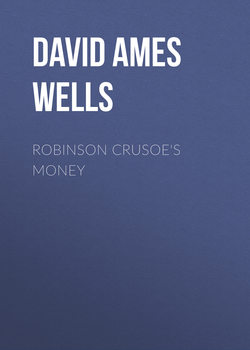Robinson Crusoe's Money

Реклама. ООО «ЛитРес», ИНН: 7719571260.
Оглавление
David Ames Wells. Robinson Crusoe's Money
Preface
Chapter I. The Three Great Bags of Money
Chapter II. A New Social Order of Things
Chapter III. The Period of Barter
Chapter IV. How They Invented Money
Chapter V. How the People on the Island and Elsewhere Learned Wisdom
Chapter VI. Gold, and How they Came to Use It
Chapter VII. How the Islanders Determined to be an Honest and Free People
Chapter VIII. How the People on the Island Came to Use Currency in the Place of Money
Chapter IX. War with the Cannibals, and What Came of It
Chapter X. After the War
Chapter XI. The New Millennium
Chapter XII. Getting Sober
Отрывок из книги
All who have read “Robinson Crusoe” (and who has not?) will remember the circumstance of his opening, some time after he had become domiciled on his desolate island, one of the chests that had come to him from the ship. In it he found pins, needles and thread, a pair of large scissors, “ten or a dozen good knives,” some cloth, about a dozen and a half of white linen handkerchiefs concerning which he remarks, “They were exceedingly refreshing to wipe my face on a warm day;” and, finally, hidden away in the till of the chest, “three great bags of money—gold as well as silver.”
The finding of all these articles—the money excepted—it will be further remembered, greatly delighted the heart of Crusoe; inasmuch as they increased his store of useful things, and therefore increased his comfort and happiness. But in respect to the money the case was entirely different. It was a thing to him, under the circumstances, absolutely worthless, and over its presence and finding he soliloquized as follows: “I smiled at myself at the sight of all this money. ‘Oh, drug!’ said I, aloud, ‘what art thou good for? Thou art not worth to me, no, not the taking off the ground. One of these knives is worth all this heap. Nay, I would give it all for a gross of tobacco-pipes; for sixpenny-worth of turnip and carrot seed from England; or for a handful of pease and beans, and a bottle of ink.’”
.....
Starting, then, with a condition of things on the island in which money had clearly neither utility nor value, let us next consider under what change of domestic circumstances it could become useful, acquire value, become an object of exchange, and constitute a standard for establishing prices.
The result of all this was, that in a little time the Dutchmen and the Indians got all the wampum, and the Yankees all the beaver-skins, Dutch herrings, Dutch cheeses, and all the silver and gold of the province. Then, as might naturally have been expected, confidence became impaired. Trade also came to a stand-still, and, to quote from the old manuscript records, “the company is defrauded of her revenues, and the merchants disappointed in making returns with which they might wish to meet their engagements.” It is safe to conclude that, after this, the commodity made use of by the Dutchmen as money was something less liable to have its value impaired than wampum.
.....